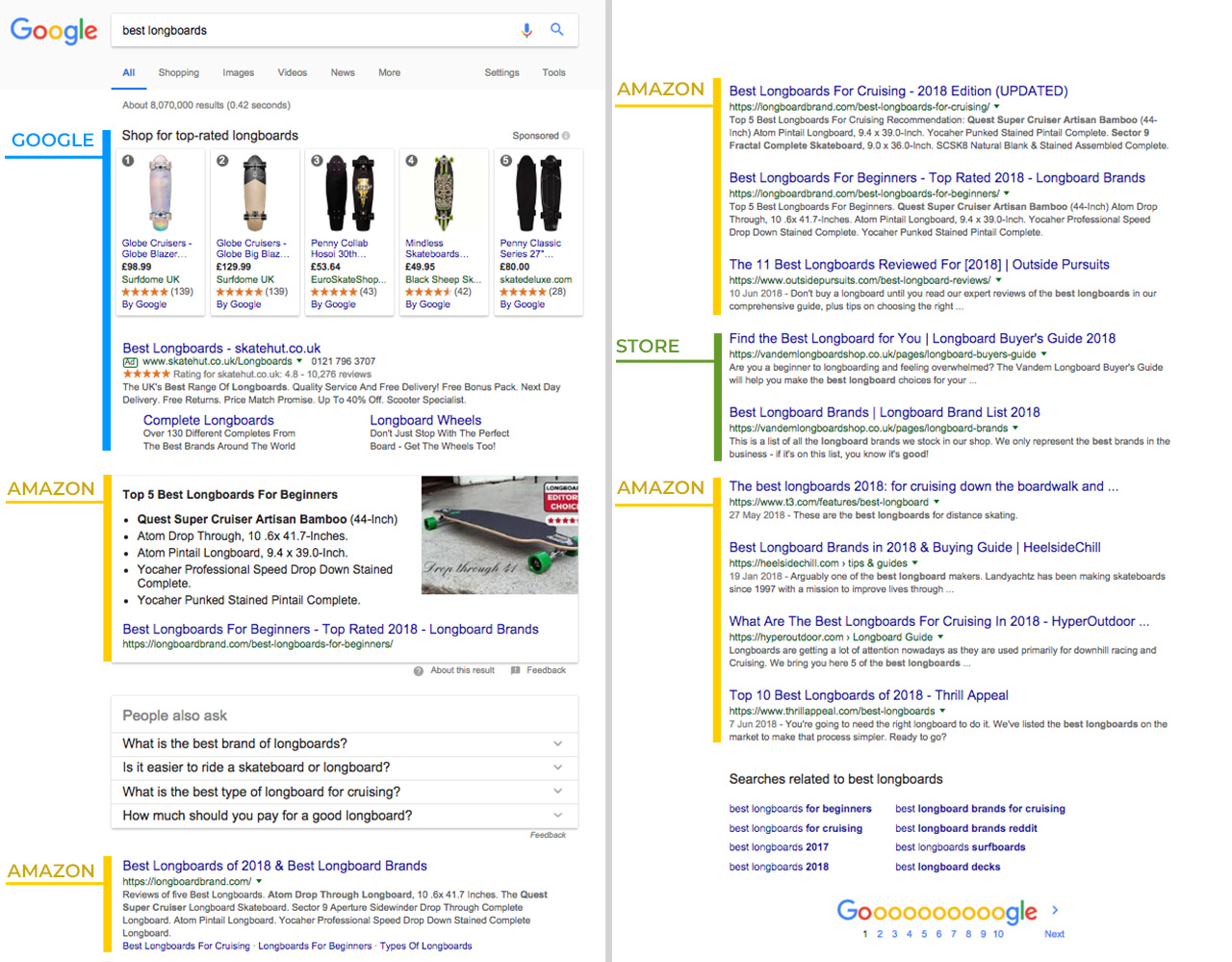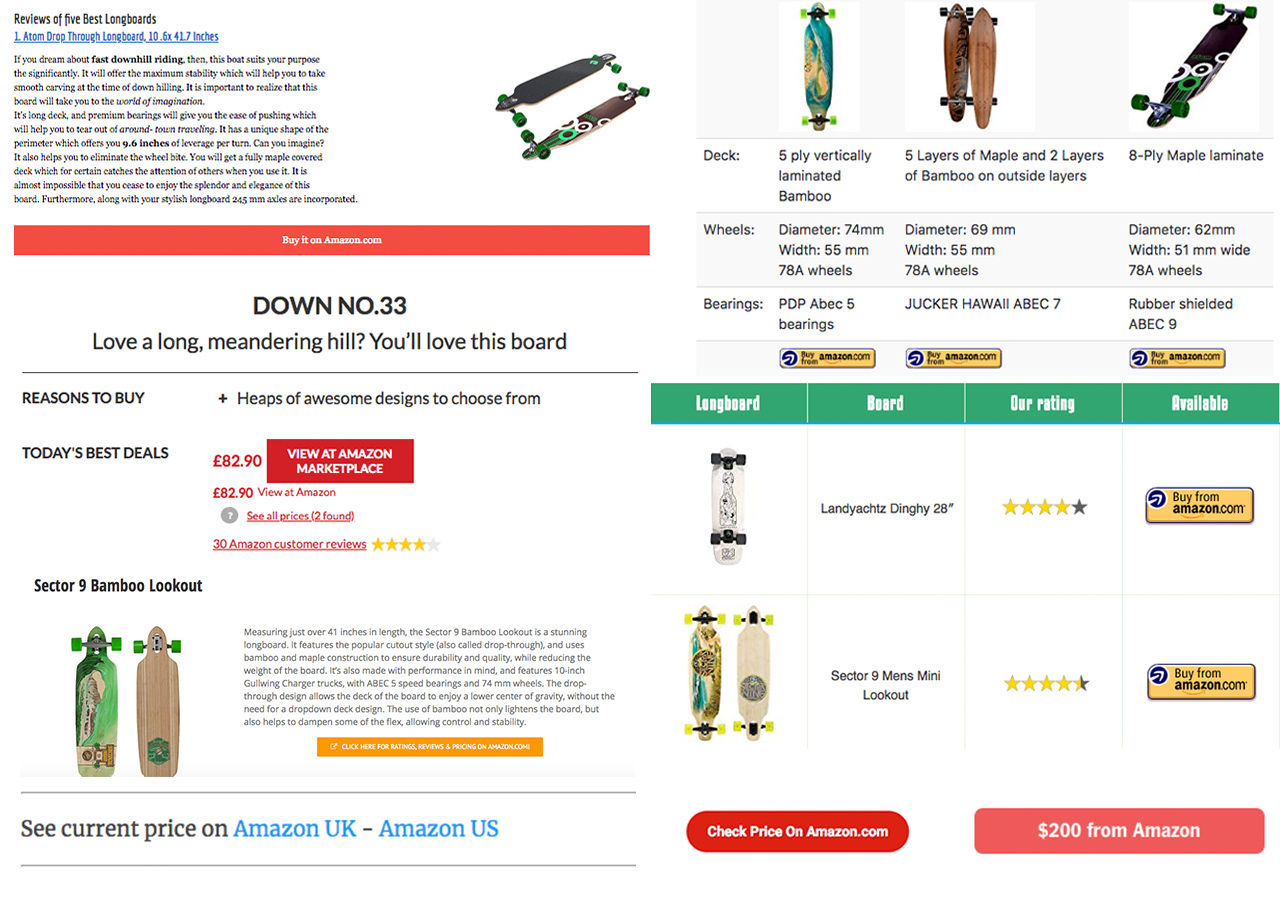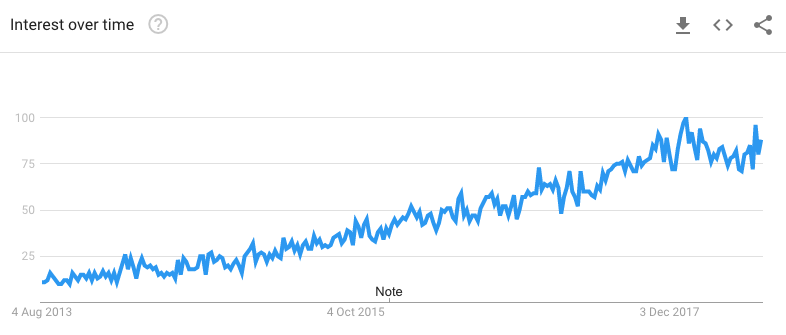There is no denying that Amazon has drastically changed how people shop online and even in stores. What started with books, quickly expanded to household items and now even groceries. Companies both in the digital realm and on the high-street buckled and eventually folded as the retailing behemoth grew its online empire. As a result, it is one of the reasons why it is becoming commonplace to hear about big brands such as Woolworths, Toy R Us and Maplin filing for bankruptcy in the news.
But how has Amazon maintained its status? Quite an interesting phenomenon that has contributed to Amazon’s online success is that it is no longer seen as just an e-commerce platform, but as a search engine as well. So much so, that research studies have found that 56% of UK, US, German and French shoppers use Amazon as their starting point in the search funnel. More significantly, many online shoppers who use Amazon, trust and remain loyal to the platform – even more than Google. In fact, in 2016, Amazon was deemed the most trustworthy Fortune 500 company based on results from 10,000 SurveyMonkey users and is #1 on the Top 5 Most Customer-Centric Companies List.
What is even more surprising, however, is how Amazon is also changing how we create content online. What started off as a handful of affiliate links scattered around the pages of popular bloggers, has now grown into specialist blogs with the clear intent to sell Amazon products. These portals look like content-rich hobby blogs but have the express intent to list Amazon products within it content.
Best of the Best
By simply looking at the SERP for ‘best longboards’ in Google, we can see the results plagued with Amazon-feeding blogs that can be broken down into three types of feeder site.
The Traditional Amazon Link
Amazon short-link in copy
https://www.longboardingguide.com/review-paris-savant-longboard-trucks/
The Integrated Approach
Dedicated buttons to Amazon
https://wearetop10.com/best-long-boards/
https://longboardingnation.com/best-longboard-reviews/
The Blatant List
Tabular data, all with Amazon-supplied buttons
https://reviewskateboard.com/
Whilst this SERP looks innocent enough, by investigating the top ten listings we can see three very clear competitors. Google, Amazon and Vandem. You can either pay out to Google by using ads in the form of shopping or paid search, buy from Amazon through the EIGHT listings that all drive you to Amazon or use a dedicated store (Vandem), who is the only organic shop listing. Vandem also have a page dedicated to why you shouldn’t trust the Amazon-bought longboards, highlighting the issues that shoppers have had buying longboards through Amazon.
https://vandemlongboardshop.co.uk/pages/cheap-longboards-completes-decks-wheels-amazon
Whilst affiliate sites are not a new occurrence, it is important to note that the steady rise in these sites, particularly from Amazon, are dramatically changing what search results we see. Therefore, these types of results need to be taken into account when preparing a digital strategy, as well as during the keyword research phase of any project. Google owns the shopping boxes at the top, so Adwords take the dominant positions at the top and right but then Amazon seem to own the rest. To an unsuspecting eye, this SERP looks like a natural mix of longboard enthusiasts dispensing useful information, but it’s really an option of either buying from Google, or buying from Amazon.
The second important factor to keep in mind is how Google reacts to this influx of Amazon satellite sites. Back in the early part of this decade, you couldn’t search for anything without an eBay listing showing up. The individual listings were subsequently downgraded and the results starting showing a more level playing field. If Google decides that Amazon is manipulating the listings through its affiliate network, then we will see a dramatic drop in sites that use the amzn.to url structure.
The Rise of FBA
Fulfilled by Amazon is a suite of fulfilment and logistics solutions enabling people to sell products in a global marketplace using Amazon’s international network of warehouses, shipping and e-commerce. Simply put, you buy the stock, Amazon holds the stock and you sell it through their online portal. Whether you are selling novelty father’s day mugs or cheap longboards, sellers can source products from overseas and sell them for a profit in some of the biggest marketplaces in the world.
Over the past five years, we have seen a dramatic increase in searches for ‘Amazon FBA’ as people have joined the new digital gold rush in a bid to get rich quick using Amazon as the base for their new empire. YouTube has 1.8 million videos that range from how to get started with Amazon FBA to discussions about the death of FBA. The influx of Amazon sellers online has meant a growth in search engine marketing services to cater for this type of website. The ‘best longboards’ SERP is just one example in which page one of Google is plagued by blogs created with the sole purpose of driving you to Amazon. I am seeing similar results for ‘best VR headsets’ and ‘best drones’ to name a few. Once a seller has a product on the new digital high street, they turn to content marketing to become an authority in that niche and attempt to own the SERP. This manipulation of results, however, will not go unchecked and this constant corralling of shoppers from Google into Amazon will need to be addressed.
It’s Not Just Fake Hobby Sites
This gold rush has not gone unseen by the bigger publications, as a search for the ‘best VR headsets’ results in nine out of the ten listings all containing links to Amazon including The Telegraph, PC World and Tech Radar. Whilst these publications are simply using their authority to earn additional revenue, it just gives more power to the shopping monopoly currently online. If a user searched Google for various products and the first ten links were Amazon, users would see the manipulation at play, but as we see Trusted Reviews, Thrill Appeal, Tom’s Guide and Longboard Brand, we are deceived into thinking there is an element of fairness in what we see, but ultimately, we are two clicks away from Amazon at any point.
Nowadays, content marketing is the order of the day and blogs, companies and affiliates are creating myriad content that fights for page one prestige. It will only be a matter of time until Google decides that ten listings that all lead to Amazon are not fair on the user and an obvious case of Google being manipulated. At which point, snowfox, walrus or some other arctic creature will be announced to cull sites with too many Amazon links. Amazon is a great site and the FBA opportunities to sell to a global market is fantastic. But when fake hobby sites start popping up around certain product types and each of the page one search listings lead back to Amazon, we have to ask ourselves if we would do something if we were Google. I know I would.



